
 |
|
|
#1 |
|
Vikingsword Staff
Join Date: Dec 2004
Location: The Aussie Bush
Posts: 4,646
|
This is an old one that has seen better days, but it is interesting for several reasons.
First, it has been modified by another culture, probably a Spanish colonist. The hilt is a typical Spanish style, and originally had small brass ferrules at either end, but the top one is missing. The hilt has only a partial tang construction (unlike many similar Spanish-style hilts, such as commonly seen in the more northern areas of the Philippines). At some point, the hilt has been painted gold, but much has worn off. Second, the top half of the gangya is missing, and obviously there is no asang asang. Third the blade is clearly of an old form, at least early 19th C. or older. It is covered with a dark patina, especially on the gangya, and the file work on the gangya has been removed and/or worn away with time. Evidence of lamination can still be seen along the blade and numerous deep edge nicks speak to heavy use at some time. Lastly, there is a very interesting inscription on the gangya. The chiseled numbers are old and have been on the blade for some time because there is evidence of corrosion of some of the numbers which blends into neighboring pitting on the blade. As you can see from the pictures, the numbers 13...2 are legible while the third figure could be a 5, 8, or 9. This is probably not a credible date -- the arrival of Europeans in the southern Philippines post dates the 14th C. -- but it raises some questions as to what the inscription means on this old kris. Comments, ideas  Ian. Very Old Moro Kris with Spanish Style Hilt 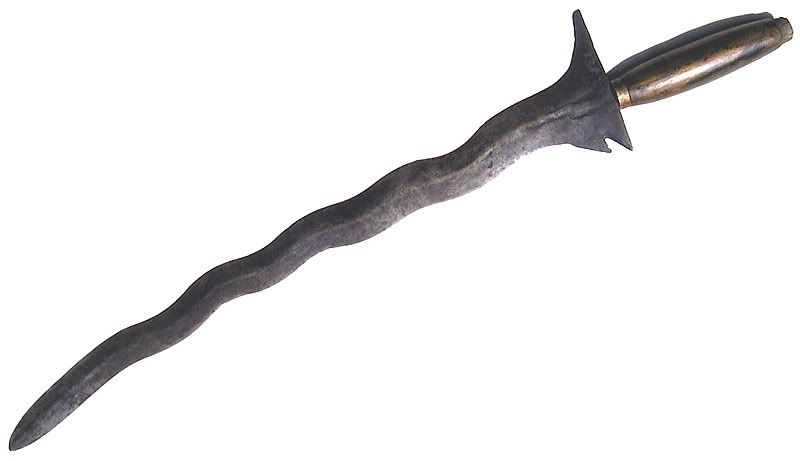 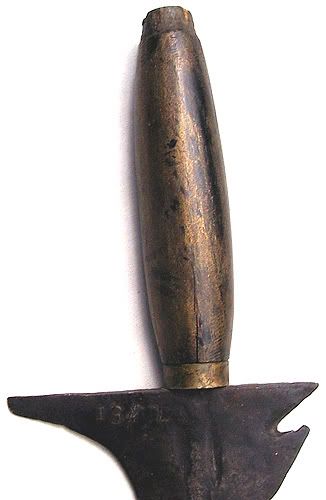 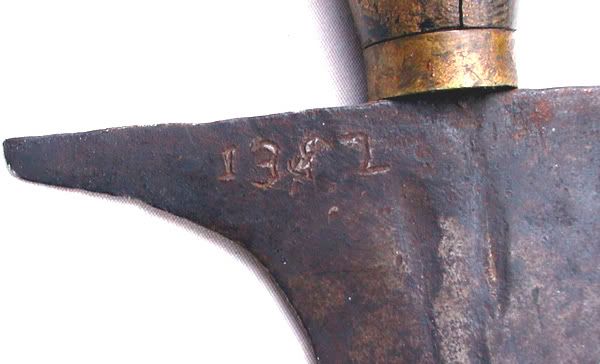 |
|
|

|
|
|
#2 |
|
Vikingsword Staff
Join Date: Nov 2004
Posts: 6,384
|
Is this yours Ian ?
How thick is the blade at the base ? Some observations / opinions , YMMV . The angle on the tail of the gangya is all wrong for it to ever have had a separate piece on top . There is an amazing lack of detail in the 'trunk' area , even providing for wear and age and it looks somehow wrong . The pecetan and sogokan are barely hinted at , hardly even rudimentary . On the whole this piece strikes me as a kris made by a non native source . One more thing , the waves are clumsily executed and uneven . A kris like object if you will . Let me wildly speculate could this be an early trade kris made outside of the area for barter with the locals , English , American , even Spanish ? |
|
|

|
|
|
#3 |
|
Member
Join Date: Dec 2004
Location: Houston, TX, USA
Posts: 1,254
|
One of those blades where it's hard to tell crudity from corrosion, at least in a photo. The grooves have a forged in look? There does not look to be a seperate gonjo, and if there ever was one it must have been a straight joining, which is not usually seen on Moro pieces, but then if it's a particularly old piece......could that be a Moslem date?
|
|
|

|
|
|
#4 |
|
Member
Join Date: Mar 2005
Posts: 306
|
Hi all!
If that is a muslim year it translates to 1961. Hopefully this chould help with a date. |
|
|

|
|
|
#5 |
|
Vikingsword Staff
Join Date: Dec 2004
Location: The Aussie Bush
Posts: 4,646
|
Rick:
It is mine -- a recent acquisition off eBay. I will add dimensions later tonight. Here are some more pictures showing a side-by-side comparison with a more traditional old Moro kris (late 18th or early 19th C.). Ian. EDIT: Here are the dimensions of these two swords. Top one (Mystery Kris) OAL = 22.75 inches Blade = 18 inches Width of gangya = 3.75 inches Thickness of blade just below handle = 3/8 inch Bottom one (Old Moro Kris) OAL = 21.75 inches Blade = 17.25 inches Width of gangya = 4 inches Thickness of blade just below handle = 1/2 inch Old Moro Kris with Spanish Hilt (2) 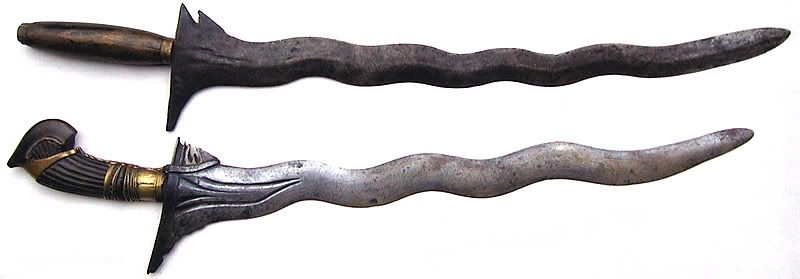 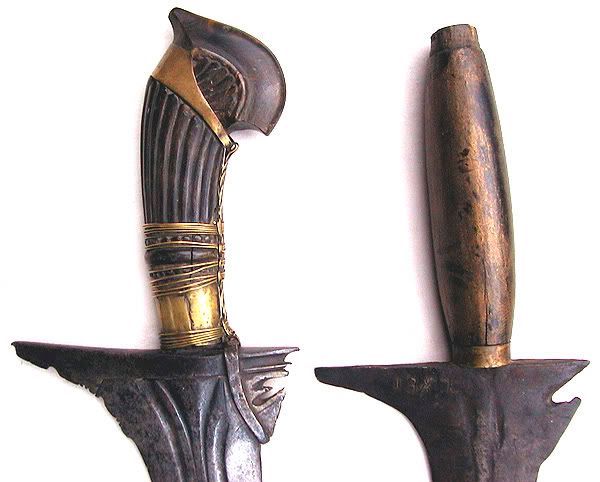 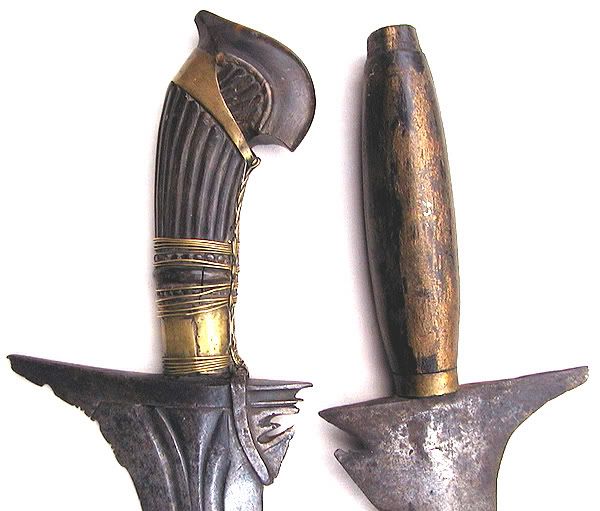 Last edited by Ian; 24th May 2005 at 02:59 PM. Reason: Dimensions addd for the two swords |
|
|

|
|
|
#6 |
|
Vikingsword Staff
Join Date: Nov 2004
Posts: 6,384
|
IMO , when viewed next to that old beauty it only serves to accentuate its alieness .
Of course smiths come in all different skill levels but still it just doesn't look look 'native' to me . A very interesting piece . |
|
|

|
|
|
#7 |
|
Member
Join Date: Dec 2004
Location: Minneapolis, MN, USA
Posts: 312
|
The number could always be an accession number (hmmm...is that the right term?). Ive seen some museums do horrible things to blades they accept (well this is not something that all museums do, but well some have). Anyways, agree with Rick, there is something odd about this kris/keris, something that goes beyond just mere corrosion. It would seem that all we really have to ID this kris would be the dapur, and even given more we've had plenty of argument over the older style kris. Especially given the lack of other features (particularly no fretwork, no detail around the trunk, no detail around where the arrowhead could be if it is an arrowhead, etc...), at least for me, it would be hard to peg this kris/keris one way or the other.
|
|
|

|
|
|
#8 |
|
Member
Join Date: Dec 2004
Location: Cincinnati, OH
Posts: 940
|
I once again submit the Aliens Theory.

|
|
|

|
|
|
#9 |
|
Vikingsword Staff
Join Date: Dec 2004
Location: The Aussie Bush
Posts: 4,646
|
When I put this one next to the other old Moro kris in the pictures above, it seemed to me that the gangya may actually be complete. So I polished the reverse side in the gangya area to remove some of the heavy patina. For a short distance I can identify a horizontal line meeting a section of an angled line where the gangya separation should be. It is very faint and only visible with a magnifying glass. I believe the gangya is actually intact and not missing its top half as I stated earlier. This is consistent with Moro work where the line of separation can be very hard to distinguish sometimes.
Acknowledging opinions above to the contrary, I believe this blade is just too well forged and the luks too symmetrical around the median ridge for it not to have been made in its host culture. This has not been forged by an alien group in the image of a Moro kris. What I think is throwing people off is the file work (or lack thereof), the extensive corrosion of the gangya area, and the likelihood that the gangya was modified by another hand. The "trunk" area, in particular, appears to have been filed down and altered. Rick: I can't find my calipers to measure the thickness of the blade. Will get back to you when I locate them. Ian. |
|
|

|
|
|
#10 |
|
(deceased)
Join Date: Dec 2004
Location: OKLAHOMA, USA
Posts: 3,138
|
THE BLADE MAY SIMPLY BE UNFINISHED, SOMETIMES A BLADE IS PUSHED INTO USE BEFORE THE FINISHING WORK CAN BE DONE. THIS COULD HAPPEN DUE TO A DIRE NEED FOR WEAPONS AS FAST AS POSSIBLE OR PERHAPS A CHEAPER MODEL OR THE FORGE COULD HAVE FALLEN INTO ENEMY HANDS, SO FINISHED AND UNFINISHED GOODS WERE TAKEN AND MODIFIED FOR USE.
MANTERIS HAS A MORO KRIS THAT APPEARS SOMEWHAT UNFINISHED AS IT DOSENT HAVE THE CUT OUT WORK DONE ON THE GAGAH OR GRENENG. I HAVE A INDONESIAN KERIS BLADE THAT I THINK IS THE CORE WITHOUT THE PARMOR SANDWICHED ON BOTH SIDES SO IT DOES HAPPEN. 
|
|
|

|
|
|
#11 |
|
Member
Join Date: Dec 2004
Location: Houston, TX, USA
Posts: 1,254
|
And here I am struck by the SIMILARITY between the two swords. Especially the taper, the curvature, and the unusual length/broadness of the luks, as well as the similarity in the overall shape of the cutout at the front of the blade base, which is on both different than on other (newer) kris sundang. I don't know whether there is any crudity at all; there is a rough and cloudy appearance, which judging from photos and further info. could easily be entirely from rust/wear. The way the two grooves are deep and seem to "trail out" into skinny ones is consistent with what we see on the other. Note that connecting the bacca/asang all the way back to a loop (positive machanical hold) around the pommel seems to maybe be the original way.
I feel that an European official of any sort from the mid 1800s on would be much more likely to use European style number stamps if he were to do a thing like number the blade? The skill in making the numbers does not seem great. This lack of skill could be for the chiselling, but it could alternatively be for writing them. I have a Javanese sword that seems to have "1940" inlaid in its blade in brass. The reason I keep saying "seems to" is that the numerals are of various sizes and nonstandard forming, and could be an unfamiliar writing making a coincidence. |
|
|

|
|
|
#12 | |
|
Vikingsword Staff
Join Date: Nov 2004
Posts: 6,384
|
Quote:
Okay , watch me flip flop .  That throws out the possibility of a foreign trade piece (at least for me) . Now the question is why would someone alter the trunk area ? Could this sword have been excavated a long time ago and corrosion had done the damage . Maybe this is an unfinished work as has been mentioned earlier , but I'm doubting that . Note the graceful curve of the gangya top on the old , complete kris . Now note the absolutely straight one on the mystery example. We have seen other examples IIRC some years ago there was a kris with an uncarved , blank trunk area ; anyone else remember this one ? Federico , was that Jimmy's kris ? I've got to disagree with you Tom ; I know everything is in the eye of the beholder but the mystery kris just appears downright clumsy in its execution compared to the other one . How about a blade length and width Ian ? |
|
|
|

|
|
|
#13 |
|
Vikingsword Staff
Join Date: Dec 2004
Location: The Aussie Bush
Posts: 4,646
|
This discussion is going much as I expected and hoped it would. The issues raised are exactly what I have been asking myself.
Now, what about that darn inscription?  It is not a credible date for the C.E., nor for a Muslim date (and why would a Muslim date not be in Arabic?). It is not a credible date for the C.E., nor for a Muslim date (and why would a Muslim date not be in Arabic?).Rick: I will add the dimensions for both of the swords above this evening. Ian. |
|
|

|
|
|
#14 |
|
Vikingsword Staff
Join Date: Nov 2004
Posts: 6,384
|
I'd also like to see more pictures of the undated side including a full one if possible please .
Have you tried spraying some WD40 into the gangya area then wiping it off after a short soak ? This might make the line of separation show up better . Now I'm leaning more toward apprentice's work . Every Panday's apprentice has to learn by doing . Still stumped by the numbers . 
|
|
|

|
|
|
#15 |
|
Member
Join Date: Feb 2005
Location: Chicago area
Posts: 327
|
Ian, nice comparison of the 2 blades. Have to agree that both are really old. The hilt on the object sword looks very old & I think the majority would agree, that it must be a replacement. It seems interesting that when we get into older kris, that they usually fall into the 18" catagory, +/- a ". Concidering the humidity & rainfall, doubt that sword could have been excavated. Got a couple that are similar to both those shown, & have to think they have conciderable age. Think the dapor is well executed for thrusting. Have a few swords that have the black patina, (very old), would any one like to give some opinions on that, time wise?
|
|
|

|
|
|
#16 |
|
Vikingsword Staff
Join Date: Nov 2004
Posts: 6,384
|
Since krisses are usually viewed within their culture point upwards does this view of the markings change anyones perceptions ?
|
|
|

|
|
|
#17 | |
|
Vikingsword Staff
Join Date: Nov 2004
Posts: 6,384
|
Quote:
Tom , could this blackness be forging scale unremoved ? |
|
|
|

|
|
|
#18 |
|
Member
Join Date: Feb 2005
Location: Chicago area
Posts: 327
|
Rick, if you mean, no "trunk" at all, the answer is no.
|
|
|

|
|
|
#19 |
|
Vikingsword Staff
Join Date: Nov 2004
Posts: 6,384
|
No Bill , I meant the surface that the hilt meets ; the top of the separate piece (gangya) always seems to have an upward curve to it .
|
|
|

|
|
|
#20 |
|
Member
Join Date: Dec 2004
Location: Minneapolis, MN, USA
Posts: 312
|
Rick, the lack of carving/fretwork kris I have seen fall into two categories. Those whose fretwork were removed purposely through either corrosion or a misguided owner (Cecil had a scary story about an owner who filed off all the fretwork on his kris), and then those whose shape/proportion would fit fretwork, but the fretwork was simply just never done for some reason or another. The second category has always fascinated me, and Cecil had mentioned it was something that struck him as interesting as well. However, in the few pieces Ive stumbled on (unfortunately never won) they all seemed to be newer pieces (circa late 19th early 20th century) and very new (eg. they looked like they had been collected shortly after being made).
This mystery piece, on the other hand, lacks the proportions to be of the second category (trying to do fretwork there would simply not be enough blade to work with). So then it would seem then that the fretwork either corroded off, or was removed purposely. Anyways, if it still has the gangya intact, I would vote against a Moro attribution. From the pics it would just be too dainty, even for some of the most corroded of archaic styled kris (regardless of who we attribute the form to). On my own archaic style piece, the gangya had fallen off, and when examining it I noticed that the wall were the gangya and the pesi met the walls were paper thin from use of wear, and it would seem far far far more robust shape than this piece given the pics. So if there is a gangya, then I would imagine the tang would be extremely tiny, again not going in line with archaic kris/keris, which have very robust tangs (even when round). I guess we could argue this could be a Moro keris before the change to kris, but it just strikes me funny. I dunno, thats just my opinion, and its hard to work off of pics. |
|
|

|
|
|
#21 |
|
Member
Join Date: Dec 2004
Location: Witness Protection Program
Posts: 1,730
|
a spaniard's attempt to recreate a kris from memory, perhaps? kinda odd seeing a kris without fretworks and "elephant's" trunk. also the numbers "1" and "3" looks to be mechanically stamped...
|
|
|

|
|
|
#22 |
|
Vikingsword Staff
Join Date: Dec 2004
Location: The Aussie Bush
Posts: 4,646
|
Just a note to let you know I added the dimensions of the Mystery sword and the other old Moro kris to the pictures above. As Bill commented, it is a very consistent feaure to find the blade lengths on these early Moro kris to be 18 +/- 1 inch. These two lie within that range, with the blade of the mystery sword being 18 inches from the tip to the hilt.
The mystery sword is a little thinner and slimmer than the other kris. Not sure this adds anything to the discussion. We know that it is corroded and may have lost some thickness relative to the better preserved sword. It is also possible that kris became generally "beefier" over time. Certainly the late 19th C. Mindanao kris became much heavier than earlier examples -- perhaps the mystery sword predates the other one shown beside it. I think Bill's comments come closest to my own thoughts about this mystery kris. BTW, I keep this one out of my bedroom and certainly not under my pillow. Who knows what stories it has to tell.  Ian. |
|
|

|
|
|
#23 |
|
Member
Join Date: Dec 2004
Location: Houston, TX, USA
Posts: 1,254
|
The straight back edge to the ganga is odd, isn't it? But it is seen on k(e)ris, so might be in line with an evolutionary form, as proposed. I don't know that it does lack an elephant trunk. The elephant trunk is the central protrusion within the large cutout at the front edge, yes? I see a protrusion within this area on the discussed sword. It is small (perhaps broken and/or rusted off), and is unusual in its placement, as it departs from the (krisly speaking) top side of the depression partway along, rather than from the center back. The angle seems similar to that on the other shown piece. Can we get a closeup?
Rick might be onto something on how to orient the writing. The mark looks in a way like a lot of mysterious marks I see on PI and other Spanish colonial stuff; letters or numbers with things that don't seem to be and whose meaning is hard to figure, often seeming to have been chiselled, or to have been struck with (handmade?) stamps that are not entirely standard forms. Both the end characters are odd looking. The center ones do look more like stampings; a 3, an E, an m? and an s? that seems to be obscured by another striking or some sort of damage? I suspect the marking is contemporary with the rehilt. Rick, it's real hard for me to tell forge scale, especially forge scale with rust, from heavy rust in a photo. |
|
|

|
|
|
#24 |
|
Member
Join Date: Dec 2004
Location: Houston, TX, USA
Posts: 1,254
|
Also odd how that front notch slants out all the way across the ganga, huh? The steep angledness is very similar to the other one though.
|
|
|

|
|
|
#25 |
|
Member
Join Date: Feb 2005
Location: Chicago area
Posts: 327
|
here are a couple that are similar to Ian's, also they both have had surgery, the new tang in one & an elephant trunk added to the other. re-placing the tang may have been at a time where it was critical to get the blade back into service, if so, certainly would highlight the lack of blades available. by the end of the 16thC, there must have been great effort to produce swords. Eventually there will be hundreds of Pandays making the kris, the early ones all would have to make thier first one. the tang is very secure, the blade is very thin, so there is little room to file a channal, for expansion of the new tang. the hole in the new tang had a iron peg pounded in to expand the tang, i'm amazed they were able to do it. the hilt appears to be very old, a crack in the bottom is discolored from leaching tang rust. strickly a thrusting sword, i suspect they blackened from being retired so long, surprised they did not get re-cycled. the ratten hilt wrapped one has had a "trunk" welded on to what appears to of originally been a beak. perhaps so as to add a baca-baca stirrup. the ganja goes straight accross. has a tulip/acorn towards the tip. the sheath is wrapped in a large leaf, tied with rattan, looks like work was always being done to it, likely has had a long life.
Last edited by Bill; 25th May 2005 at 05:27 AM. |
|
|

|
|
|
#26 |
|
Member
Join Date: Dec 2004
Location: Houston, TX, USA
Posts: 1,254
|
That is a semistandard Moro tang repair; comments or other examples?
|
|
|

|
 |
| Thread Tools | Search this Thread |
| Display Modes | |
|
|